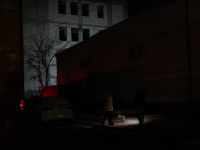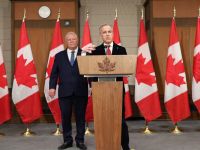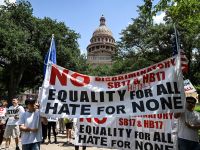Last Friday’s summit between Jordan's King Abdullah and US President Barack Obama at the White House again highlights Jordan’s determination and relentless efforts to find a political solution to the conflict in Syria.
Officials insist that all talk about Jordanian military involvement in its war-torn neighbour is baseless, pointing out that any cooperation with the US is only intended to protect the Kingdom from any chemical attacks, particularly in the heavily populated areas of the north, and to alleviate the burdens it is shouldering as a result of hosting around half-a-million Syrian refugees.
The officials, who accompanied the King on the visit to the US last week, speak about Jordan’s concerns with regards to the Syria file, some of which are immediate and the others long-term, pertaining to possible scenarios that might emerge, the worst being the division of the country, or a prolonged civil war that will continue to take its toll on neighbouring countries.
The immediate concerns have to do with the continued bloodshed, destruction and flow of refugees, whose number in Jordan is estimated to rise to one million by the end of this year, and two to three million next year if the crisis continues. The latter scenario would be unimaginable for Jordan, in view of the country’s limited resources and the rise in public complaints. Many Jordanians, including members of Parliament, are calling for the closure of the border and the establishment of a buffer zone within Syria to provide a safe haven for those escaping war and killings.
Officials stress that Jordan cannot close the border in the face of people escaping a conflict, some threatened with death back home.
According to these officials, a no-fly buffer zone on the Syrian border would be a feasible scenario, but would require a United Nations resolution that has to have the blessing of Russia and China, both allies of Syrian President Bashar Assad and permanent members of the UN Security Council with veto power.
For this reason and others Jordan is trying to push for a united international bloc with the participation of Russia and China to end the bloodshed and offer protection to Syrian civilians escaping the war that has already reaped tens of thousands of lives, some officials say.
Any solution, according to these officials, has to take into consideration the nature of the conflict at the domestic front and beyond. At the local level, this conflict is pitting local forces representing the Alawite sect of President Assad against the Sunni sect, to which the majority of the population belongs. Other domestic players who have to be taken into consideration and reassured of having a role in any future settlement include Kurds, Christians and Druze.
A Kurdish split in the northeast, analysts believe, would constitute a threat to Iraq and Turkey. An Alawite spilt on the Mediterranean coast of Syria would mean leaving a land-locked Sunni enclave with the majority of the population in the southeastern parts of Syria.
An analyst said he expects the Alawites to try to expand their presence in a divided Syria to make it extend from the Mediterranean to the Golan Heights, meaning it would encircle Lebanon from the north and east and link up with the Jordanian border in the south, in case this scenario materialises.
“Assad would be keen to give any future Alawite state a border with Israel as this would be a valuable card for his sect in the future,” notes the analyst.
As to the possible Sunni land-locked enclave, all depends on who will be in control, with Islamist forces leading the revolt against Assad being the most likely candidates.
Officials say if this scenario materialises, Jordan hopes for the most moderate to dominate.
It would be a frightening scenario should extremist forces, particularly those allied with Al Qaeda network, take over, and later link up with those in neighbouring Iraq. This would be a nightmarish scenario to Jordanians who still remember Al Qaeda’s terrorist attacks against three Amman hotels in 2005 which killed scores of innocent civilians and injured many others.
Such a threat would be a danger not only to Jordan but to the region as a whole, not excluding any country, officials and analysts warn.
All antagonists within Syria have their supporters regionally or beyond, with the regional supporters including Iran, Hizbollah and the Iraqi regime on Assad’s side, and Turkey, Qatar, Saudi Arabia, Egypt and the UAE on the other. Internationally, the Syrian regime still enjoys the support of Russia and China, which are keen to protect their interests in the region. Western countries that voiced support for the Syrian people’s revolt against their regime in the beginning started to take a reserved stand with the rise in the number of Islamist forces joining hands with the Syrian resistance. Arab countries are divided in their support for the opposition, particularly because of the involvement of radical elements in the ongoing revolt.
Jordan finds itself in the eye of the storm, struggling to protect its people and interests, and working to safeguard Syria’s unity and territorial integrity, while attempting to end the bloodshed as soon as possible.
The Kingdom realises that without the active participation of international heavyweights, including the US, EU, Russia and China, it will not be possible to resolve the conflict, which has turned into a multi-level proxy war and an arena for settling accounts, with the Syrian people paying the heaviest price for regional and international rivalries.
Jordan is also aware that without getting the Syrian opposition to speak in one voice, no agreement can be reached with the Syrian regime on ending the bloodshed.
All these Jordanian fears, summed up by analysts in Amman and officials accompanying the King on his Washington visit, have been one way or another communicated to the US administration and congressional leaders, as they were also communicated to other regional and international players.
The King was very articulate in warning of the possible dangers before the start of his talks with Obama at the White House’s Oval Office last Friday.
“I think, sir, that we are both working very hard to look for a political solution for a Syria that is one that is, as you mentioned, inclusive so that we’re bringing everybody together, which is sort of our last hope as we’re now seeing the surge of the second threat appear, which is that of militant terrorist organisations that have risen over the past several months,” the King said.
During the talks, officials said, His Majesty communicated a desire to have a leading US role in finding a political solution, not US military involvement which Jordan is very keen to avoid.
“… I am confident, with your leadership and with meetings that we will have today, that we can find a mechanism to bring a solution... as quickly as possible,” the King said before the start of the closed-door meetings at the Oval Office.








